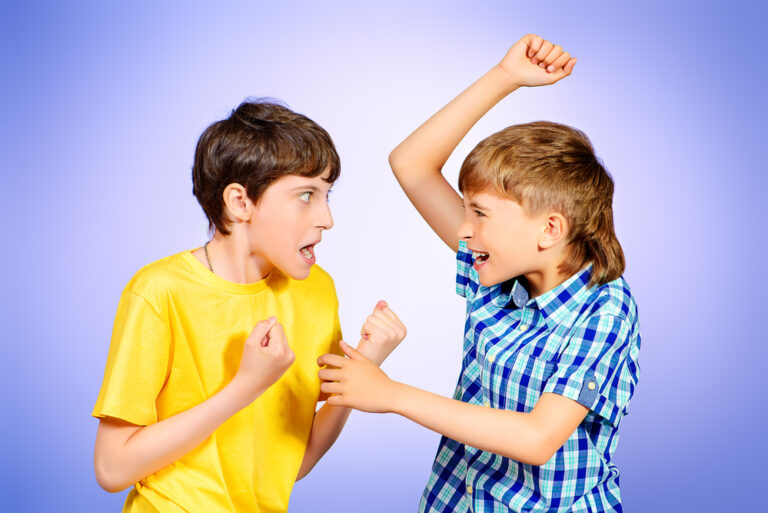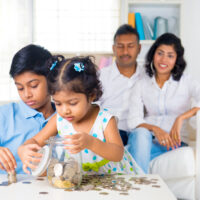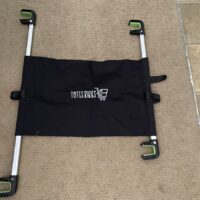Oh, no. It just happened. You were watching your child at the playground and got a front-row seat to them getting hit by another kid. On the other hand, maybe the incident didn’t happen on your watch at all, but you got to hear all about it from the teacher at the end of the day.
What happens now? Besides you seeing red as your blood boils, of course. Knowing your child got hit can feel just like a slap to your own face. Unfortunately, it’s a bit of a disheartening rite of passage because seemingly every kid goes through it eventually. You need to know how to handle it.
Despite my son only being 3 years old, I’ve already experienced this. Pre-pandemic, when fast food joints still had their play palaces open, I let my then 2-year-old frolic with some kids while I sat close by munching on some french fries.
At some point, an older boy decided to crown himself king of the jungle gym and told my toddler he couldn’t go down the slide. My son was already timid about the height he had to climb to get to the slide, so I watched the scene play out with apprehension.
My toddler wasn’t much of a talker then, so he tried to sneak past the other boy without speaking to him. Play Place King didn’t like this and shoved my son away from the slide. Now I had to decide what to do. I had no idea how to handle it when another child hit my child.
Why Children Hit
Children hitting each other is very common behavior. Most parents know this well since they spent the better part of their child’s early years being a punching bag for tiny fists. Common or not, though, the behavior should be discouraged.
Before we put ourselves in between two kids, let’s examine why children hit in the first place.
The youngest of toddlers tend to hit because they can’t communicate their needs properly. They are still getting the knack of this talking thing and yet you don’t understand that their babble means “More milk, please!” When pre-verbal kids get frustrated, they might hit to get their point across.
As children learn to communicate better, they may still hit, kick, or shove. We can blame this on the immature prefrontal cortex. Basically, this is the front portion of the brain. This brain chunk is responsible for so many executive actions, but especially in decision-making and moderating social behavior. Basically, these are the two functions that keep adults from acting on every impulse they have.
When exactly does the prefrontal cortex mature then? Well, recent research suggests it won’t be fully developed until 25 years of age! That’s a subject for another day, however, because we still working on playground scuffles today.
Simply put, children have no self-regulation skills. When they’re frustrated and angry, they don’t know what to do with the emotion and this often comes out as temper tantrums or hitting.
It is important for you to know though that hitting is considered normal for young children. It doesn’t inherently mean there is something wrong. A child who slaps, shoves, or kicks another isn’t a sociopath in the making, as convinced as we might be that they are.
It was a year ago and I still remember that little boy’s name who shoved my toddler. I was convinced he had to be some sort of nasty bully.
In reality, he really wasn’t. He was just a kid. I didn’t feel that way at the moment though.
How to Handle it in the Moment – Remain Calm
So, another kid has hit your kid. Now what? How to handle when another child hits your child?
Should you:
A) Hit that kid back?
B) Locate the offending kid’s parent and recite a list of profanities to them?
C) Immediately sign your child up for jiu-jitsu classes?
As a rational being, you know none of the above is the right answer (although I do hear jiu-jitsu can be fun). All three of the choices may pop into your brain instantaneously at the time, but you cannot act on any of them.
Above all else, you will have to fight your instinct and stay calm. Yelling at a stranger or a stranger’s child in public won’t help anything unless you want to be known as “that crazy parent.”
Your first move should be focused on your child. Ask them if they are okay. Hopefully, only their ego is bruised. Acknowledge that they must feel angry or hurt.
If your child is crying, try not to shush them and end the crying. Big feelings end eventually and you don’t want to make them feel ashamed. They just got hit, after all!
How to Handle it in the Moment – The Other Parent
There is another parent or guardian in this scenario and, with any luck, they will also intervene. The hitter probably has a parent who was keeping a close eye as well. This parent may step in and reprimand their child.
A parent may not be around. Maybe no one intervenes. Is it time to yell at this other child?
As much as you may want to, you are not going to discipline someone else’s child. If this is a playground situation, your child probably won’t encounter this kid again so go ahead and remove your child from the situation.
If the hitter is a regular playdate, make sure this wasn’t just a one-off. The playdate could have not slept well or is just having a bad day – we all do. If you witness the aggression more than once, try to separate the children for a calm down. Then, it’s time to discuss it with the parent.
When talking to another parent, don’t be accusatory. Again, stay calm. You’re both just parents looking out for your child and you don’t want to put them on the offensive, especially if this is a friend or family member.
What if this happened at daycare or school? Well, you still have to remain calm, but also discuss it with the teacher or caretaker. Find out what was done about the hitting and what will be done in the future to prevent it from happening again. You have a natural urge to protect your child and you just can’t do that when they are under someone else’s care, so advocate for your child where you can.
If allowed, and if you want, you can ask to arrange to speak to the other child’s parent, especially if it becomes a recurring problem between the kids.
How to Handle it Later
Once you’re back home, it would be a good idea to discuss the event with your child. Go over what happened and how it made your child feel. Let them explain their emotions and you should validate how they feel. As one psychologist writes, tell your child their feelings make sense and you welcome and accept them.
Be sure to remind your child that their playmate’s behavior was wrong and your child is not to repeat it. Explain how everyone gets angry and that’s okay but physical aggression isn’t a healthy outlet.
If your child is old enough, you may want to give your child some hypotheticals and ask how they would handle feeling mad in that situation. For kids who are too young, stick with books.
If you’d like to discuss anger in an age-appropriate way, so many books have been written on the subject for youngsters. Here are some great options:
- Hands Are Not for Hitting
- I Am Stronger than My Anger
- A Little Spot of Anger
- Roaring Mad Riley
- Daniel Tiger’s Neighborhood: I’m Feeling Mad
On the subject of Daniel Tiger, my son and I like to use the little song the little tiger uses for when he’s angry. “When you feel so mad that you wanna roar, take a deep breath and count to four!” It’s simple and cheesy, but it works. I also think it will be stuck in my head until my son goes to college, but that’s another issue entirely.
Conclusion
When it happens to your child, you’ll have a lot of feelings. Still, you now know how to handle it when another child hits your child. Remember to:
- Stay calm
- Check on your child
- Involve the other parent if needed
- Discuss it later with your child
To circle back, how did I handle my son’s play place kerfuffle? Honestly, I did nothing. It was my first time in such a situation and, embarrassingly, I froze.
After the shove, my child stood back up, relatively unphased. The other kid, seemingly coming to his senses, moved to the side and let my son pass to the slide. There weren’t any there altercations and everyone went home no worse for wear.
However, I know that wasn’t the last of it. When my child starts school and extracurriculars soon, I know similar instances will start popping up.
Once it happens again, I’ll be better prepared and armed with knowledge. I will remain calm (I hope)! With any luck, you’ll be better prepared, too.






